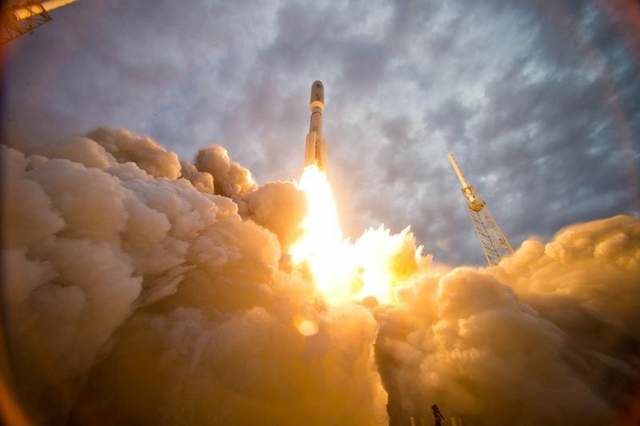GAO Urges DoD To Take Care On New EELV Competition; Gather Data First
Posted on
WASHINGTON: The Pentagon’s push to open the EELV to greater competition may be counterproductive to the best management of the program. The Government Accountability Office says this approach “could limit program oversight and scheduling flexibility” for the Evolved Expendable Launch Vehicle.
Why? It’s simple really: “The Air Force plans to develop an acquisition strategy for the next phase of competitive launches before it has any actionable data from the first competitive launches…” But that is the cost of adopting a commercial approach. It’s “more flexible” if you’re a company, but maybe not if you’re the government. For example, the Pentagon will give up access to the enormous amount of data from the United Launch Alliance (ULA), the current single provider of national security launch to the military and the Intelligence Community.
So the Air Force should “use an incremental approach to the next acquisition strategy to ensure that it does not commit itself to a strategy until data is available to make an informed decision.” The Air Force — gasp — agreed with the GAO.
Of course, that doesn’t mean they will actually slow the evolution of the EELV program. But it may mean they ensure they get as much data from the companies as possible. And that may mean changing some of the rules governing the competition. Maybe.
 The greatest impact of the Air Force going slower would probably fall on SpaceX, eager to start doing business now that it is certified to handle national security launch. ULA, of course, is on its 98 straight successful launch, including a limited number of commercial jobs.
The greatest impact of the Air Force going slower would probably fall on SpaceX, eager to start doing business now that it is certified to handle national security launch. ULA, of course, is on its 98 straight successful launch, including a limited number of commercial jobs.
“The launch industry is undergoing changes, and the ability of the domestic industry to sustain two or more providers in the long-term, while desirable, is unclear. Additionally, only one company is currently certified to compete with ULA for national security launches, and there are no other potential competitors in the near future,” the report says. “To adequately plan for future competitions and ensure informed decision making before committing to a strategy, it will be important for the Air Force to obtain knowledge about its new acquisition approach and on the launch industry.”
As the report notes, the new approach means a “shift (of) the risks associated with the cost of performance to the contractors.” But using a firm-fixed-price contract will mean the Air Force will have “significantly less insight into program costs and performance” than it does under its current contract with ULA.
What does that mean? “The Air Force is at risk of making decisions about future EELV acquisitions without sufficient knowledge. In addition, the Air Force views competition as crucial to the success of its new acquisition strategy, yet the viability of a competitive launch industry is uncertain. The launch industry is undergoing changes, and the ability of the domestic industry to sustain two or more providers in the long-term, while desirable, is unclear. Additionally, only one company is currently certified to compete with ULA for national security launches, and there are no other potential competitors in the near future. To adequately plan for future competitions and ensure informed decision making before committing to a strategy, it will be important for the Air Force to obtain knowledge about its new acquisition approach and on the launch industry.”
Another key problem is that, under the Pentagon’s rules governing commercial deals, the federal government will depend on ULA, SpaceX and any other company to do what it calls mission assurance. That’s the critical and highly complex job of making sure launch goes as planned and everything works. When you’re putting a satellite worth $1 billion or more into orbit, your launch system had better work. The new approach will mean the companies are responsible for that, not the government. While the companies may do a better job than the government in the long run. the GAO says that’s going to be hard to tell because the government doesn’t really know what works — just that it does.
GAO makes a pretty strong case that the Air Force may need to rethink its approach: “We have reported in the past on the Air Force’s lack of insight into mission assurance costs and activities within the EELV program. The Air Force has said that mission assurance is the most important contributing factor to launch mission success; however the service has not assessed the sufficiency or excess of these activities.”
Subscribe to our newsletter
Promotions, new products and sales. Directly to your inbox.

